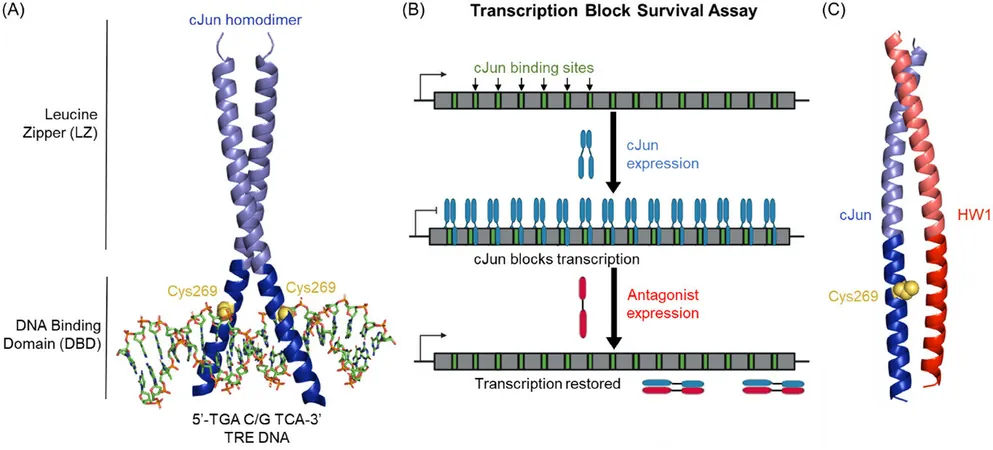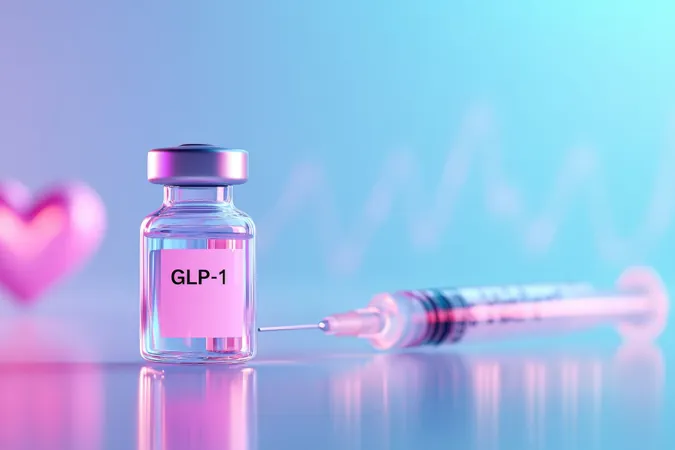
Breakthrough Discovery: Irreversible Inhibitors for Cancer's 'Undruggable' cJun Protein
2025-03-20
Author: Wei
Breakthrough Discovery: Irreversible Inhibitors for Cancer's 'Undruggable' cJun Protein
In a groundbreaking study, researchers at the University of Bath have made a significant advancement in the quest to tackle cancer’s notoriously 'undruggable' protein target, cJun, by identifying irreversible inhibitors. This remarkable finding could herald a new era in cancer treatment, providing hope for patients facing the most aggressive forms of the disease.
Transcription factors like cJun are critical proteins that regulate gene activity and have been linked to cancer progression. Historically, efforts to develop small molecule drugs to inhibit these proteins have been met with frustration. However, scientists are now turning to peptide fragments—short chains of amino acids—as a novel strategy to effectively block these hard-to-target proteins.
In their latest study, published in the journal *Advanced Science*, the team unveiled an innovative drug discovery platform known as the Transcription Block Survival (TBS) assay. This advanced technology allows researchers to explore a vast array of peptide candidates, aiming to find those that can effectively switch off cancer-driving transcription factors.
Previously, the team had succeeded in identifying reversible inhibitors for cJun, but this recent achievement stands out as the first instance of creating peptides that not only bind but also do so irreversibly. This means that once these peptides attach to cJun, they lock it in place, preventing it from functioning altogether.
The mechanics behind cJun's activity are fascinating yet complex: it consists of two symmetrical halves that latch onto DNA to modulate gene expression. In cancerous cells, this can lead to rampant cell division and tumor growth. The researchers cleverly engineered a peptide that targets one half of cJun, effectively preventing it from pairing up with its counterpart and engaging with DNA.
Dr. Andy Brennan, a key author of the study, likened the irreversible inhibitor’s action to a 'harpoon' that shoots out at cJun, anchoring itself firmly to ensure the protein cannot bind to DNA—a breakthrough for peptide-based therapies.
The TBS assay introduced by the researchers is groundbreaking in that it directly evaluates peptide activity within living cells, addressing the common issues faced by many potential drug candidates. Jody Mason, Chief Scientific Officer at Revolver Therapeutics and a professor at the University of Bath, emphasized that traditional small molecules often fail due to toxicity or poor cell penetration. The TBS assay mitigates these challenges by simulating the real cellular environment, taking into account factors like proteases that may otherwise interfere with peptide efficacy.
As we stand on the brink of potentially transformative new treatments, there is burgeoning optimism about the future of cancer therapeutics. The researchers are hopeful that this novel platform could pave the way for further discoveries, revealing more promising drug candidates for other similarly 'undruggable' targets. This breakthrough not only represents a scientific milestone but also reignites hope for effective cancer treatments that can change lives.
Stay tuned, as innovations in cancer treatment unfold—could this be the game-changer we've all been waiting for?



 Brasil (PT)
Brasil (PT)
 Canada (EN)
Canada (EN)
 Chile (ES)
Chile (ES)
 Česko (CS)
Česko (CS)
 대한민국 (KO)
대한민국 (KO)
 España (ES)
España (ES)
 France (FR)
France (FR)
 Hong Kong (EN)
Hong Kong (EN)
 Italia (IT)
Italia (IT)
 日本 (JA)
日本 (JA)
 Magyarország (HU)
Magyarország (HU)
 Norge (NO)
Norge (NO)
 Polska (PL)
Polska (PL)
 Schweiz (DE)
Schweiz (DE)
 Singapore (EN)
Singapore (EN)
 Sverige (SV)
Sverige (SV)
 Suomi (FI)
Suomi (FI)
 Türkiye (TR)
Türkiye (TR)
 الإمارات العربية المتحدة (AR)
الإمارات العربية المتحدة (AR)